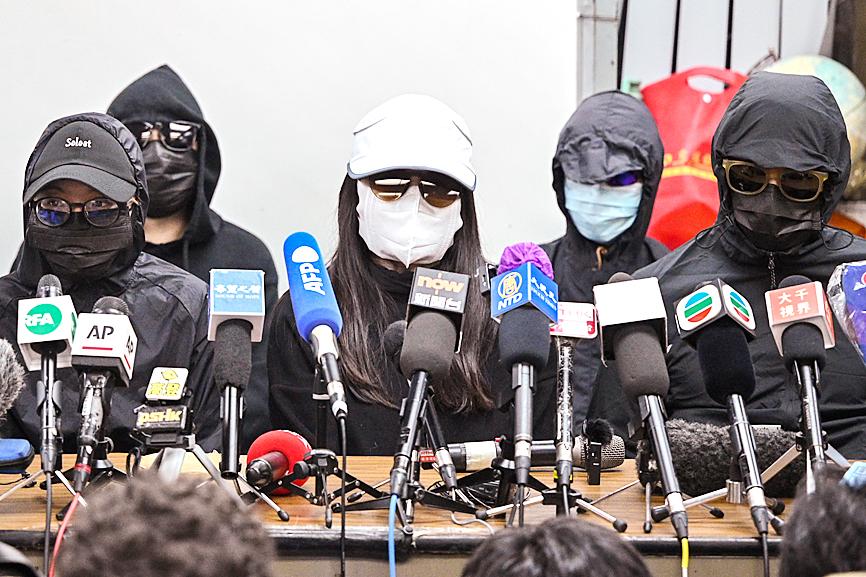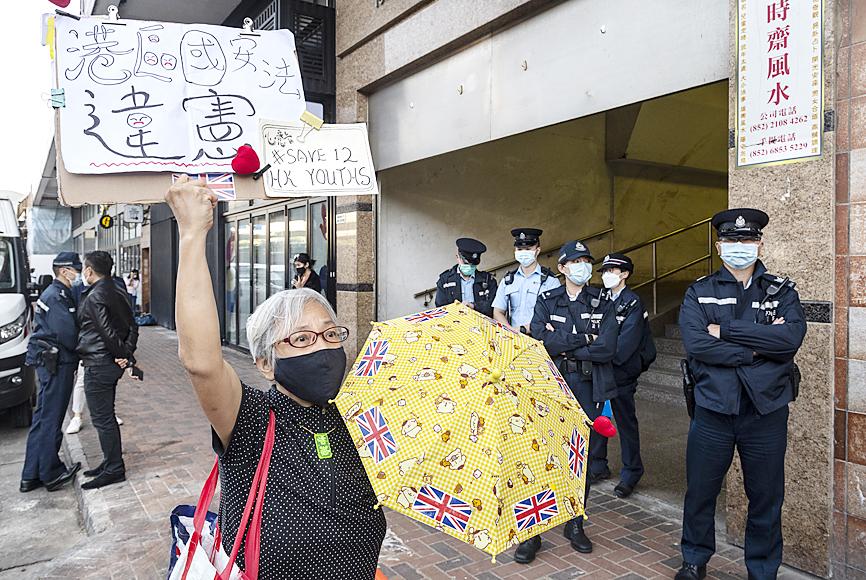Trials for 10 people accused of attempting to flee Hong Kong by speedboat for Taiwan amid a government crackdown on dissent got under way in China yesterday, a court official said.
The defendants face charges of illegally crossing the border, while two face additional charges of organizing the attempt, according to an indictment issued in Shenzhen.
A spokesperson for the Yantian District People’s Court in Shenzhen said that the trials began yesterday afternoon as scheduled.

Photo: AFP
The spokesperson declined to give her name, as is usual among Chinese court officials.
The families of seven of those charged received telephone calls from their court-appointed lawyers saying trials would begin yesterday, a member of the 12 Hongkongers Concern Group told reporters.
The families had called for the hearing in the Shenzhen court to be broadcast live, after they were unable to attend due to the short notice for the trial and COVID-19 quarantine requirements.

Photo: EPA-EFE
They were only notified of the trial date on Friday, while their lawyers have been barred from meeting with the detainees. Chinese authorities instead appointed state-approved legal representation.
Asked about the case, Chinese Ministry of Foreign Affairs spokesman Zhao Lijian (趙立堅) said it was “currently being processed,” but did not confirm the trial had begun.
“The people concerned are suspected of illegally crossing or organizing others to cross the border and are being prosecuted according to the law,” Zhao told reporters at a daily briefing in Beijing.
He dismissed a US embassy statement on the case as interference in China’s “judicial sovereignty.”
Separate hearings were expected for two minors who were also aboard the boat that was apparently heading for Taiwan when it was stopped by the Chinese coast guard on Aug. 23. One is just 16.
Relatives of the 12 have said that the accusations against them are politically motivated.
In a joint letter over the weekend, the families said they “strongly condemn” the authorities’ decision to hold the trial in “de facto secret” at Yantian District People’s Court.
“We urge governments to send embassy personnel to the hearing to guarantee a proper and fair trial by the courts in Shenzhen,” they said, noting that those detained include British, Portuguese and Vietnamese nationals.
The defendants can be sentenced to up to a year in prison for crossing the border and seven years for organizing the trip.
They were picked up after entering mainland Chinese waters for crossing the maritime border without permission.
Amnesty International Hong Kong program manager Lam Cho Ming (林祖明) said in a statement that the group doubted the trials would be fair since defendants had been denied basic rights such as the ability to hire legal representation of their own choosing.
“China must guarantee that all 10 people whose case is set to be heard today, as well as the two others detained with them, get fair and public hearings,” Lam said. “They must also ensure that none of the 12 are subjected to torture or other ill-treatment.”
Amnesty said that the defendants were joining in the hearing by video link, apparently due to COVID-19 concerns, and that family members could not attend because of a required two-week quarantine period.
China has a history of putting dissidents on trial around the Christmas and New Year period to avoid Western scrutiny.
Additional reporting by AFP

The CIA has a message for Chinese government officials worried about their place in Chinese President Xi Jinping’s (習近平) government: Come work with us. The agency released two Mandarin-language videos on social media on Thursday inviting disgruntled officials to contact the CIA. The recruitment videos posted on YouTube and X racked up more than 5 million views combined in their first day. The outreach comes as CIA Director John Ratcliffe has vowed to boost the agency’s use of intelligence from human sources and its focus on China, which has recently targeted US officials with its own espionage operations. The videos are “aimed at

STEADFAST FRIEND: The bills encourage increased Taiwan-US engagement and address China’s distortion of UN Resolution 2758 to isolate Taiwan internationally The Presidential Office yesterday thanked the US House of Representatives for unanimously passing two Taiwan-related bills highlighting its solid support for Taiwan’s democracy and global participation, and for deepening bilateral relations. One of the bills, the Taiwan Assurance Implementation Act, requires the US Department of State to periodically review its guidelines for engagement with Taiwan, and report to the US Congress on the guidelines and plans to lift self-imposed limitations on US-Taiwan engagement. The other bill is the Taiwan International Solidarity Act, which clarifies that UN Resolution 2758 does not address the issue of the representation of Taiwan or its people in

US Indo-Pacific Commander Admiral Samuel Paparo on Friday expressed concern over the rate at which China is diversifying its military exercises, the Financial Times (FT) reported on Saturday. “The rates of change on the depth and breadth of their exercises is the one non-linear effect that I’ve seen in the last year that wakes me up at night or keeps me up at night,” Paparo was quoted by FT as saying while attending the annual Sedona Forum at the McCain Institute in Arizona. Paparo also expressed concern over the speed with which China was expanding its military. While the US

SHIFT: Taiwan’s better-than-expected first-quarter GDP and signs of weakness in the US have driven global capital back to emerging markets, the central bank head said The central bank yesterday blamed market speculation for the steep rise in the local currency, and urged exporters and financial institutions to stay calm and stop panic sell-offs to avoid hurting their own profitability. The nation’s top monetary policymaker said that it would step in, if necessary, to maintain order and stability in the foreign exchange market. The remarks came as the NT dollar yesterday closed up NT$0.919 to NT$30.145 against the US dollar in Taipei trading, after rising as high as NT$29.59 in intraday trading. The local currency has surged 5.85 percent against the greenback over the past two sessions, central